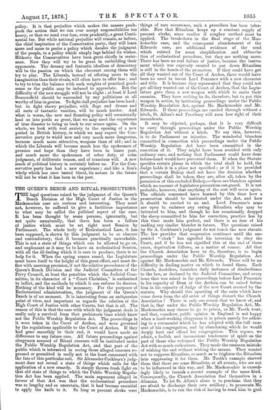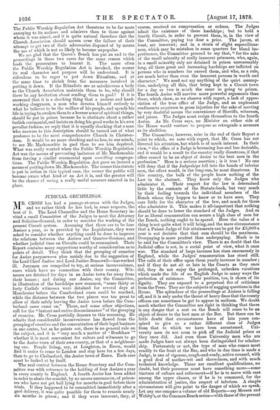THE QITEEN'S BENCH AND RITUAL PROSECUTIONS.
Uas legal questions raised by the judgment of the Queen's -Bench Division of the High Court of Justice in the Mackonocliie case are curious and interesting. They must not, however, be suffered to give a factitious importance to what may be called the political aspect of the case. It has been thought by some persons, ignorantly, but not quite unnaturally, that there has been a failure of justice which must be set right next Session by Parliament. The whole body of Ecclesiastical Law, it has been supposed, is shown by this judgment to be so obscure and contradictory, that it becomes practically unworkable. This is not a state of things which can be allowed to go on, and unpleasant as it may be to have an ecclesiastical Session, with all the ill-feeling which it is sure to produce, there is no help for it. When the spring comes round, the Legislature must brace itself to the height of this great effort, and must de- fine with unerring precision, if not the relative precedence of the Queen's Bench Division and the Judicial Committee of the Privy Council, at least the penalties which the Judicial Com- naittee, in its character of a "Court Christian," is authorised to inflict, and the methods by which it can enforce its decrees. Nothing of the kind will be necessary. For the purposes of Ecclesiastical administration, the judgment of the Queen's Bench is of no moment. It is interesting from an antiquarian point of view, and important as regards the relation of the High Court of Justice with other Courts, but that is all. The reason of this is that the case with which the judgment deals is really only a survival from that prehistoric time which knew not the Public Worship Regulation Act. The proceedings in it were taken in the Court of Arches, and were governed by the regulations applicable to the Court of Arches. If they had gone smoothly to their end, it would have made no difference to any future case. All future proceedings against clergymen accused of Ritual excesses will be instituted under the Public Worship Regulation Act, and that part of the public which is interested in seeing these alleged excesses re- pressed or permitted is really not in the least concerned with the fate of this particular suit. Sir Alexander Cockbuires judg, meat does not reveal a state of things which calls for the application of a new remedy. It simply throws fresh light on that old state of things to which the Public Worship Regula- tion Act has been applied. The main argument alleged in favour of that Act was that the ecclesiastical procedure was so lengthy and so uncertain, that it had become essential to apply the knife to it. So long as peccant clerks were things of rare occurrence, such a procedure has been toler- able. Now that Ritualism keeps up a constant supply of peccant clerks, some readier if rougher method must be applied. The break-down in the final stage of the Mac- konochie case, and the consequent abandonment of the Edwards case, are additional evidence of the need which existed for some simplification and abbrevia- tion of ecclesiastical procedure, but they are nothing more. There has been no real failure of justice, because the instrur ment which was expressly created to put down Ritualism is still in the hands of the promoters. If they could have got all they wanted out of the Court of Arches, there would have been no need to invest Lord Penzance with a new character and title. It is because they represented that they could not get all they wanted out of the Court of Arches, that the Legis- lature gave them a new weapon with which to smite their enemies. They have nothing to do, therefore, but to put this weapon in action, by instituting proceedings under the Public Worship Regulation Act, against Mr. Mackonochie and Mr. Edwards. If these proceedings are carried through without a hitch, St. Alba.n's and Prestbury will soon lose sight of their incumbents.
It may be objected, perhaps, that it is very difficult to carry through proceedings under the Public Worship Regulation Act without a hitch. To say this, however, is to do Parliament an injustice. The wonderful blunders committed in connection with proceedings under the Public Worship Regulation Act have been committed in the execution of it. They might have been avoided with only ordinary care, and nothing that Parliament could have done before-hand would have prevented them. If when the Statute specifies certain places in which the trial shall be held, the Judge holds it in a place not specified ; or if it be provided that a certain Bishop shall not have the decision whether proceedings shall be taken, they are, after all, taken by the permission of this excluded Bishop,—these are blunders against which no amount of legislative precaution can guard. It is not probable, however, that anything of the sort will occur again. The officials concerned have learned by this time how a prosecution should be instituted under the Act, and how it should be carried to an end. Lord Penzance's arms are open to embrace any erring Ritualists who may be intrusted to him, and though he has occasionally dropped the sheep committed to him for correction, practice has by this time made him perfect, and there is no fear of his making any similar blunder in future. The questions raised by Sir A. Cockburn's judgment do not touch the new statute. The law provides that suspension continues until the sus- pended " clerk " has signified his intention to obey the Court, and if he has not signified this at the end of three years, deprivation follows, as a matter of course. All that the Church Association have to do, therefore, is to begin proceedings under the Public Worship Regulation Act against Mr. Mackonochie and Mr. Edwards. There will be no difficulty in finding matter on which to found them. Each Church, doubtless, furnishes daily instances of disobedience to the law, as declared by the Judicial Committee, and every issue that was raised in the proceedings before Lord Penzance in his capacity of Dean of the Arches, can be raised before him in his capacity of Judge of the new Court created by the statute. Why should this upsetting of the suits which have come down from the old order of things disturb the Church Association ? There is only one reason that we know of, and that is, that under the Public Worship Regulation Act, Mr. Mackonochie may choose to go to prison, as Mr. Tooth went, and that, somehow, public opinion in England is not happy when a hard-working clergyman is in prison merely for adher- ing to a ceremonial which he has adopted with the full con- sent of his congregation, and by abandoning which he would deeply hurt and offend his congregation. This argues, we admit, a foolish and inconsistent tenderness of spirit on the part of those who welcomed the Public Worship Regulation Act with so much enthusiasm. They made the common mistake of wishing the end without wishing the means. They wanted not to suppress Ritualism, so much as to frighten the Ritualists into suppressing it for them. Mr. Tooth's example showed them that there are some Ritualists, at all events, who are not to be influenced in this way, and Mr. Mackonochie is exceed- ingly likely to furnish a second example of the same kind. Consequently, the Church Association find themselves in a dilemma. To let St. Alban's alone is to proclaim that they are afraid to discharge their own artillery ; to prosecute Mr. Mackonochie, is to run the risk of having to send him to gaol. The Public Worship Regulation Act threatens to be far more annoying to its authors and admirers than to those against whom it was aimed, and it is quite natural therefore that the Church Association should mourn over the failure of their attempt to get two of their adversaries disposed of by means the use of which is not so likely to become unpopular. We are glad that the Queen's Bench has put an end to the proceedings in these two cases for the same reason which leads the prosecutors to lament it. The more often the Public Worship Regulation Act is invoked, the sooner its real character and purpose will be understood. It is ridiculous to be eager to put down Ritualism, and at the same time to shrink from the measures involved in putting it down. If the Ritualists are as mischievous a body as the Church Association maintain them to be, why should there be any hesitation about sending them to gaol ? If it is answered that it is a shocking thing that a zealous and hard- working clergyman, a man who devotes himself entirely to what he believes to be the welfare of his people, and spends his life in trying to awaken them to a keener sense of spiritual things, should be put in prison because he is obstinate about a rather foolish ceremonial, and insists on doing his good works in his own peculiar fashion, we reply that it is equally shocking that a man who answers to this description should be turned out of what professes to be the most comprehensive Church in Christen- dom. It would be no more shocking and no less, to our minds, to see Mr. Mackonochie in gaol than to see him deprived. What was really wanted when the Public Worship Regulation Act was the means of preventing imitators of Mr. Mackonochie from forcing a similar ceremonial upon 'unwilling congrega- tions. The Public Worship Regulation Act gave us instead a means of putting down Mr. Mackonochie. The sooner this statute is put in action in this typical case, the sooner the public will become aware what kind of an Act it is, and the greater will be the chance of seeing a really useful measure enacted in its place.































 Previous page
Previous page